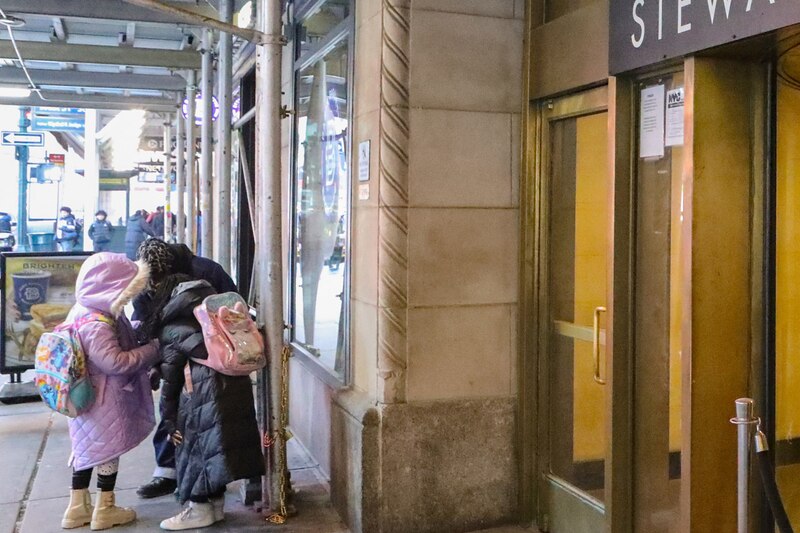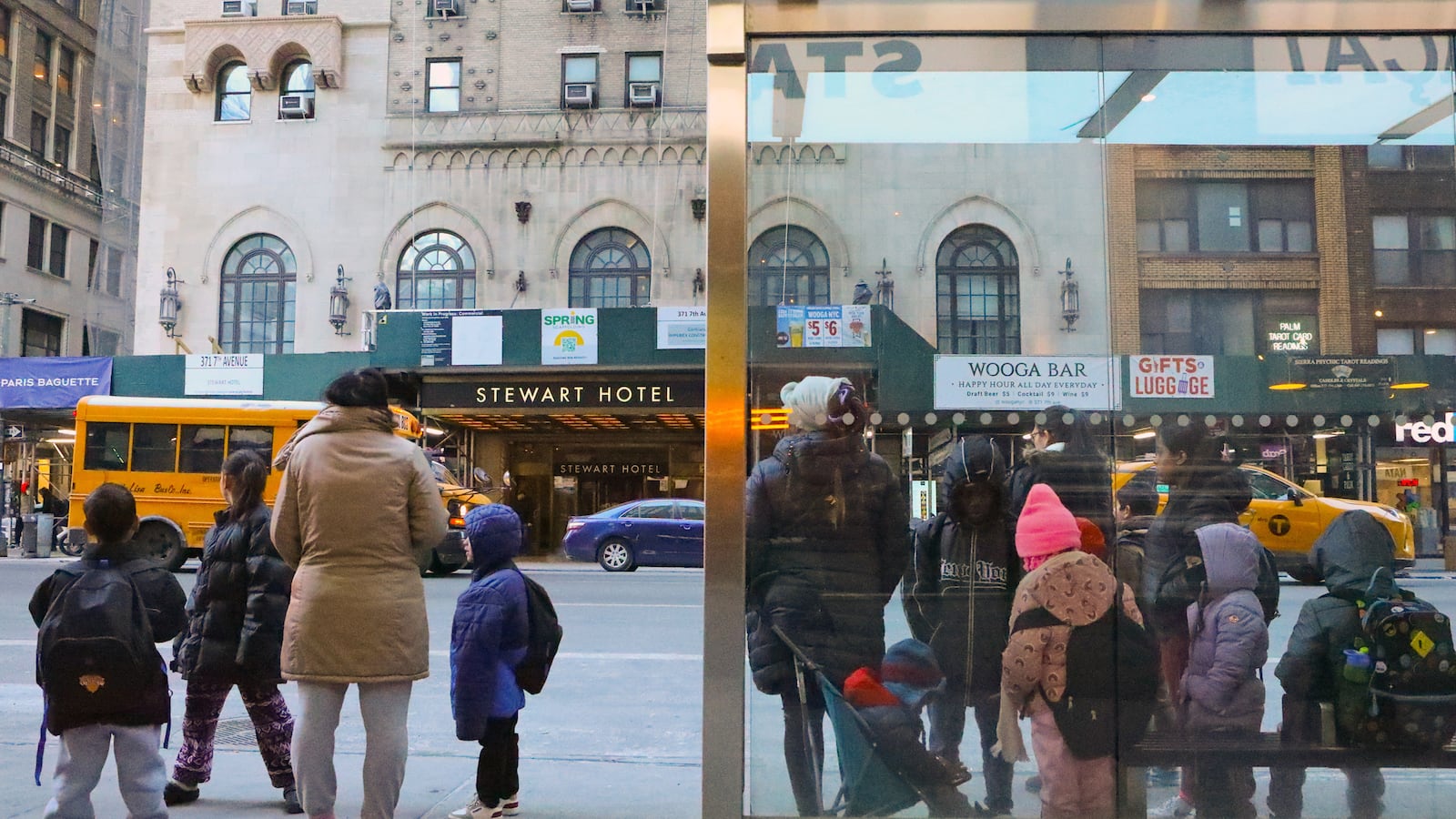Sign up for Chalkbeat New York’s free daily newsletter to get essential news about NYC’s public schools delivered to your inbox.
This article is part of an ongoing collaboration between Chalkbeat and THE CITY.
Hallways at the Stewart Hotel, a midtown Manhattan shelter for migrant families, are typically bustling on weekday mornings with kids and parents on their way to school.
They were eerily empty on Thursday morning.
A similar scene played out at the nearby Roosevelt Hotel shelter and intake center, where a line of migrant families waiting to get back inside following school pickup was far shorter than normal Thursday afternoon. The majority of kids stayed home “because of that fear,” said one father in Spanish.
And in Bushwick, Brooklyn, one dad who warily sent his kids to school said he was in the minority of families at the shelter to do so.
“Almost nobody is sending their kids [to school] in case they’re taken,” said Amanda, a Venezuelan mother staying at the Stewart who kept her three children out of school all week and asked to use only her first name out of fear of jeopardizing her immigration case. She estimated that about 100 kids at the shelter stayed out of school this week. “Everyone is scared.”
On high alert after President Donald Trump’s inauguration this week and worried about his promise to fast-track deportations, scores of immigrant families kept their kids home from school, multiple parents said.
Educators are working hard to reassure anxious parents that their kids will be safe in school, according to interviews with eight school leaders, as the New York City’s Education Department prohibits federal law enforcement agents from entering schools except under narrow circumstances. But they’re also grappling with how to quell concerns at a time when federal action seems to be ramping up by the day.
As soon as Trump took office, he rescinded a longstanding internal policy prohibiting Immigration and Customs Enforcement, or ICE, from making arrests at “sensitive locations” like churches and schools, further heightening fears for families. His pledge to begin mass deportations of millions of undocumented immigrants nationwide hit close to home on Thursday when immigration officers launched a workplace raid across the Hudson River in Newark. Chicago Public Schools officials said Friday that agents showed up at a Chicago elementary school but school staff barred them from entering.
It’s difficult to know how many families across the five boroughs are keeping their kids out of school because of deportation fears. An estimated 48,000 newcomers have enrolled in city schools since summer 2022.
Daily attendance, which averaged 90% last year, dipped to the mid-80s on Tuesday and Wednesday before rebounding to 89% Thursday, according to daily attendance data from the Education Department, though other factors including the frigid temperatures and Regents Exams administration for high schoolers likely played a role.
Some educators are sounding the alarm that fears of immigration enforcement could keep kids out of school in large numbers — and will take a psychological toll on the kids who do show up.
“I cannot tell you how many parents have come to me today … Kids don’t want to come to school,” a parent coordinator at a Corona, Queens, school with a large immigrant population, told Mayor Eric Adams at a town hall this week. “Kids are scared to leave home and not come back to see their parents.”
“We are very clear, children should go to school,” Adams responded. “We are going to continue to stand up for all New Yorkers, documented and undocumented.”
But Adams has also cultivated an increasingly close relationship with Trump, sitting down with his “Border Czar” to discuss shared priorities, visiting Trump in Mar-A-Lago, and attending the inauguration in Washington, D.C., on Monday. Adams, who was indicted on federal corruption charges last year and could theoretically receive a pardon from Trump, has said his efforts to cooperate with the new administration are for the benefit of the city, and that his focus for immigration enforcement is on people who have committed crimes.
The mayor has said he will not criticize Trump publicly, and declined to take a stance on Trump’s decision to open the door to ICE making arrests at schools — a position some educators said undercuts his attempts to reassure educators and immigrant families.
“I didn’t feel like my institution was being protected,” said Lorenzo Chambers, the principal of P.S. 279 in Brooklyn, referring to Adams’ response to a question about immigration enforcement at schools and other sensitive locations. “I think [he’s] playing politics with it — and he’s on both sides.”
Principals struggle to reassure wary families
Principals are preparing guidance counselors to work with students who fear that their families could be deported, hosting information sessions with families about their rights, and reminding school staff of city rules that forbid sharing information with federal immigration officials or providing access to the building without a warrant.
One Manhattan middle school principal fielded an early morning phone call this week from a mother worried about traveling to drop off her daughter. The principal, who spoke on condition of anonymity out of fear that his school could be targeted by immigration officials, reassured the mom that despite the end of the federal policy limiting immigration arrests at schools, he would do everything possible to protect students.
“ICE is going to have to arrest me before they arrest your daughter,” he told the mom, adding that they would lock her daughter in his office if needed. The mother ended up bringing her child to school.
Dan Steinberg, co-principal of Harlem Link Charter School, said the school is making sure that it has accurate contact information for families in the event that immigration officials arrive and the school needs to quickly reach caregivers.
“We hope nothing happens but we can’t promise families that no one is going to show up,” Steinberg said.
Several migrant parents at the Roosevelt Hotel in midtown the city has used as its migrant arrival center since 2023 said workers at the shelter hadn’t offered much reassurance about potential immigration raids as families tried to piece together information from news reports, social media posts, and panicked conversations in WhatsApp groups.
Even parents who said that their children’s schools had clearly communicated their plans to protect students said that they weren’t convinced.

“They tell us to bring them, that they’ll be safe,” said one Venezuelan mother at the Stewart, another midtown hotel being used as a shelter.
“But we’re very scared, so better to wait a couple days to see what happens, continued the mother, who declined to share her name for fear of immigration consequences.
Most school leaders said they felt the guidance from the city Education Department has been helpful and clear. But that doesn’t make it any less bewildering trying to keep up with the fast-changing news at the federal level.
“I don’t know how prepared you can be when every day you’re hearing something else,” said a principal at a Manhattan school that’s enrolled many migrant students, who spoke on the condition of anonymity because they’re not authorized to talk to the media.
Attendance struggles predate this week
While several principals said it’s too early to tell whether attendance has taken a big hit this week because of immigration concerns, some noted attendance barriers for migrant students that pre-dated Trump. Those include housing instability and the city’s 60-day shelter eviction policy, which often results in families moving around the city and missing days of school at a time as they struggle to settle in and secure transportation, principals said. (City officials recently said they’re amending the policy to give families who have already gotten one 60-day notice a reprieve). Kids are also often pulled out of school for obligations like court dates.
One Manhattan principal said families sometimes depart the city without notice, leaving the school responsible for verifying that they’ve enrolled in a new school before discharging them. The principal added that they worried that more families are “going to go into hiding” now that Trump is in office.
Missing even a few extra days of school can feel like a big setback for kids still trying to settle in and learn a new language.
Samantha, a first-grader staying at the Stewart, said she enjoys reading, writing, and drawing at school, but has resorted to watching her tablet all day this week since her mom has kept her home because of deportation fears.
A mom of a 4-year-old who hasn’t been to school this week said, “It’s very difficult because she’s used to her friends, to playing.”
For the families who did decide to send their kids, the decision often came with intense anxiety.
Gleinjer, a Venezuelan mother of three at the Stewart, decided to send her kids to school Thursday after initially keeping them home. Her oldest, an eighth-grader, made sure to plug in her cellphone fully the night before so she could contact her mom in case immigration officials showed up, Gleinjer said.
“She said, ‘Mommy, I charged my phone. … Anything happens, and I will call you,’” Gleinjer said in Spanish. “She’s scared.” (That underscored recent concerns from State Education Commissioner Betty Rosa about how a looming statewide ban of cell phones in schools could limit communication between migrant caregivers and their children.)
Jehinzo Gonzalez, the father of two school-aged children at a shelter in Bushwick, said he’s continued to take the kids to school even as leaving them there now fills him with dread. He’s photocopied his kids’ asylum paperwork and other immigration documents to keep in their backpacks.
On a recent afternoon they were a few minutes late at dismissal and he panicked.
“I was scared, I was worried. I didn’t know if something had happened,” he said. “So it’s true it’s causing so much anguish, and there’s such fear and uncertainty. But we keep fighting, and hoping that things will turn out OK.”
Michael Elsen-Rooney is a reporter for Chalkbeat New York, covering NYC public schools. Contact Michael at melsen-rooney@chalkbeat.org
Gwynne Hogan covers Brooklyn for THE CITY.
Alex Zimmerman is a reporter for Chalkbeat New York, covering NYC public schools. Contact Alex at azimmerman@chalkbeat.org.

